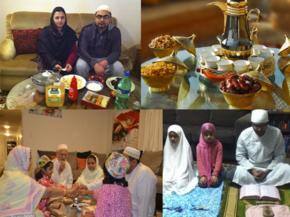Ramadan in four frames

With all its significance, the most beautiful aspect about the holy month of Ramadan is that it stands for ‘togetherness’. It not only spreads an air of sacrosanctity within the entire Muslim community during this time of the year, but also strengthens the family bond, driving the young and old alike in a family to come together and observe this month with utmost dedication. Arwa Janjali captures the different hues of Ramadan through four Muslim families in Auckland, each following their own distinctive beliefs to partake in its essence.
Faith across generations
The atmosphere of piousness spreads in the Bohra household as soon as Ramadan begins. The family, which belongs to the Dawoodi Bohra community (a sub-sect of Shia Muslims), thoroughly follows each and every belief associated with the holy month. There is an immaculate observation in terms of prayers and fasts, with the two little girls in the house joining their parents and granparents in the recitation of Quran, fasts and praying five times a day.
“For me, the significance of Ramadan is to develop intense faith in religion and inculcate it in my daughters so that when they grow up, they follow the same and remain in the same environment. Ramadan also gives an opportunity to exercise self control. Apart from its religious connotation, fasting helps in cleansing, detoxifying and purifying one’s system. Also, we believe fasting is for all senses and hence, we refrain from watching television during this time too,” Batul Bohra, the woman of the family, tells us.
The Bohras go to their community hall every evening to pray and break their fast, joining in for the community dinner at the hall thereafter. “My bedtime storytelling session with the girls also revolves around Ramadan during this month as I narrate stories of the Prophet and Ali to them along with translating the ‘waaz’ (lectures by the priest at the community hall) in English. My younger daughter Lubaina, who will turn seven, began fasting last year. She fasted for around 19 days,” says the proud mother.
As compared to the majority of Muslims, Dawoodi Bohras do not follow the moon during Ramadan. They go by the calendar, which determines the date of Eid exactly after 30 days.
Month of minimalism
Focussing on the message – ‘spread justice, forsake anger, remove sources of division and improve sympathy between each other’ – the Shaikh family observes Ramadan keeping its core significance in mind. This also extends to having a minimalistic approach to everything during this one month. Hence, whether it’s food or the overall lifestyle, the Shaikhs forego all luxury. The family ardently follows a routine, putting themselves in the shoes of those people who are actually surviving with basic necessities.
“Ramadan is about giving up the desire for material needs. To slow down one’s animal soul, thereby killing all lust and greed. Hence, this month not only calms us down but also disciplines us. My family prays at home five times a day, we sleep early, rise up early and go for lectures at the Husseiniya Centre in Pakuranga every odd day,” says Sajid Shaikh. As opposed to common perception, which highlights Ramadan as a month of ‘Fasting and Feasting’, the Shaikh family exercises a strict regime with respect to their food habits as well. “For ‘sehri’ (the meal before the break of dawn), we just have a banana, bread and butter. We don’t make anything for ‘iftar’ (the meal to break the fast) and there is nothing extravagant cooked for dinner too. The meals are very basic,” informs Shaikh.
The Shaikhs belong to the larger sect of Shia Muslims, who follow the moon and start Ramadan a few days after the Dawoodi Bohras.
In prayer, day and night
For Naveed Shahzad’s family, Ramadan is a month which brings the whole family together on the dining table. ‘Sehri’ becomes the breakfast that they otherwise never have and dinner is an elaborate affair where everyone eats together. While the ‘sehri’ is generally parathas, curd and eggs, the ‘iftar’ comprises of a sumptuous variety of dishes – from lamb nuggets and chicken wings to palak and fish pakoras accompanied by milkshakes, juices and the likes. But beyond the food fervour, the days in the Shahzad family during Ramadan revolve around ‘rehmat’ (blessings from Allah), ‘magfirat’ (forgiveness from Allah for one’s sins) and ‘nijaat’ (saving one’s self from hell).
“Ramadan is a month when there is no distraction from the ‘Shaitaan’ (devil). And we spend as much time as we can in doing ‘ibaadat’ (remembering God). Prayers take centre stage and we also wake up after midnight to pray the ‘tarabi’ namaz,” explains Shahzad. As per the belief of Sunni Muslims, which is said to be the largest sect of Islam, ‘tarabi’ is the time when Allah is on the seventh heaven and there is acceptance of one’s ‘duas’ (prayers). Hence, ‘tarabi’ namaz holds a lot of importance for Sunnis during Ramadan.
“My wife and I also keep fasts for six days after Eid, as we believe that is equivalent to fasting for the whole year,” informs Shahzad.
Fasting and feasting
The Chougles, another Sunni Muslim family, revel in the essence of the holy month. “Ramadan is something that we eagerly wait for and we enjoy the process,” says Rehana Chougle, who also tells us how living in a joint family makes Ramadan all the more special for her. “My father-in-law conducts the morning, evening and ‘tarabi’ namaz at home, just like it takes place in the mosque. Since I am not able to go to the mosque, I like the exact atmosphere of the mosque being created at home. Eight of us pray together with my father-in-law leading us all,” she adds.
‘Iftar’ forms the highlight too as the family indulges in a lavish fare of at least four to five dishes every day, including a mix of different cuisines. “I love cooking and ‘iftar’ for us is a veritable feast with stuff that we usually don’t get a chance to make throughout the year. Along with signifying worship, purity, forgiveness and charity, Ramadan for our family also symbolises happiness. As we dedicate this month to Allah, we also maintain the element of celebration through food,” Rehana explains.
Her two daughters (five and six years old) also actively participate in all things pious during this month. “Even though the eligible age for kids to keep fasts is seven years, my elder daughter has already begun to keep fasts once or twice during this month since last year and the younger one will start this year. I want them to get used to the cycle by the time they are eligible,” she says.
With all its significance, the most beautiful aspect about the holy month of Ramadan is that it stands for ‘togetherness’. It not only spreads an air of sacrosanctity within the entire Muslim community during this time of the year, but also strengthens the family bond, driving the young and old...
With all its significance, the most beautiful aspect about the holy month of Ramadan is that it stands for ‘togetherness’. It not only spreads an air of sacrosanctity within the entire Muslim community during this time of the year, but also strengthens the family bond, driving the young and old alike in a family to come together and observe this month with utmost dedication. Arwa Janjali captures the different hues of Ramadan through four Muslim families in Auckland, each following their own distinctive beliefs to partake in its essence.
Faith across generations
The atmosphere of piousness spreads in the Bohra household as soon as Ramadan begins. The family, which belongs to the Dawoodi Bohra community (a sub-sect of Shia Muslims), thoroughly follows each and every belief associated with the holy month. There is an immaculate observation in terms of prayers and fasts, with the two little girls in the house joining their parents and granparents in the recitation of Quran, fasts and praying five times a day.
“For me, the significance of Ramadan is to develop intense faith in religion and inculcate it in my daughters so that when they grow up, they follow the same and remain in the same environment. Ramadan also gives an opportunity to exercise self control. Apart from its religious connotation, fasting helps in cleansing, detoxifying and purifying one’s system. Also, we believe fasting is for all senses and hence, we refrain from watching television during this time too,” Batul Bohra, the woman of the family, tells us.
The Bohras go to their community hall every evening to pray and break their fast, joining in for the community dinner at the hall thereafter. “My bedtime storytelling session with the girls also revolves around Ramadan during this month as I narrate stories of the Prophet and Ali to them along with translating the ‘waaz’ (lectures by the priest at the community hall) in English. My younger daughter Lubaina, who will turn seven, began fasting last year. She fasted for around 19 days,” says the proud mother.
As compared to the majority of Muslims, Dawoodi Bohras do not follow the moon during Ramadan. They go by the calendar, which determines the date of Eid exactly after 30 days.
Month of minimalism
Focussing on the message – ‘spread justice, forsake anger, remove sources of division and improve sympathy between each other’ – the Shaikh family observes Ramadan keeping its core significance in mind. This also extends to having a minimalistic approach to everything during this one month. Hence, whether it’s food or the overall lifestyle, the Shaikhs forego all luxury. The family ardently follows a routine, putting themselves in the shoes of those people who are actually surviving with basic necessities.
“Ramadan is about giving up the desire for material needs. To slow down one’s animal soul, thereby killing all lust and greed. Hence, this month not only calms us down but also disciplines us. My family prays at home five times a day, we sleep early, rise up early and go for lectures at the Husseiniya Centre in Pakuranga every odd day,” says Sajid Shaikh. As opposed to common perception, which highlights Ramadan as a month of ‘Fasting and Feasting’, the Shaikh family exercises a strict regime with respect to their food habits as well. “For ‘sehri’ (the meal before the break of dawn), we just have a banana, bread and butter. We don’t make anything for ‘iftar’ (the meal to break the fast) and there is nothing extravagant cooked for dinner too. The meals are very basic,” informs Shaikh.
The Shaikhs belong to the larger sect of Shia Muslims, who follow the moon and start Ramadan a few days after the Dawoodi Bohras.
In prayer, day and night
For Naveed Shahzad’s family, Ramadan is a month which brings the whole family together on the dining table. ‘Sehri’ becomes the breakfast that they otherwise never have and dinner is an elaborate affair where everyone eats together. While the ‘sehri’ is generally parathas, curd and eggs, the ‘iftar’ comprises of a sumptuous variety of dishes – from lamb nuggets and chicken wings to palak and fish pakoras accompanied by milkshakes, juices and the likes. But beyond the food fervour, the days in the Shahzad family during Ramadan revolve around ‘rehmat’ (blessings from Allah), ‘magfirat’ (forgiveness from Allah for one’s sins) and ‘nijaat’ (saving one’s self from hell).
“Ramadan is a month when there is no distraction from the ‘Shaitaan’ (devil). And we spend as much time as we can in doing ‘ibaadat’ (remembering God). Prayers take centre stage and we also wake up after midnight to pray the ‘tarabi’ namaz,” explains Shahzad. As per the belief of Sunni Muslims, which is said to be the largest sect of Islam, ‘tarabi’ is the time when Allah is on the seventh heaven and there is acceptance of one’s ‘duas’ (prayers). Hence, ‘tarabi’ namaz holds a lot of importance for Sunnis during Ramadan.
“My wife and I also keep fasts for six days after Eid, as we believe that is equivalent to fasting for the whole year,” informs Shahzad.
Fasting and feasting
The Chougles, another Sunni Muslim family, revel in the essence of the holy month. “Ramadan is something that we eagerly wait for and we enjoy the process,” says Rehana Chougle, who also tells us how living in a joint family makes Ramadan all the more special for her. “My father-in-law conducts the morning, evening and ‘tarabi’ namaz at home, just like it takes place in the mosque. Since I am not able to go to the mosque, I like the exact atmosphere of the mosque being created at home. Eight of us pray together with my father-in-law leading us all,” she adds.
‘Iftar’ forms the highlight too as the family indulges in a lavish fare of at least four to five dishes every day, including a mix of different cuisines. “I love cooking and ‘iftar’ for us is a veritable feast with stuff that we usually don’t get a chance to make throughout the year. Along with signifying worship, purity, forgiveness and charity, Ramadan for our family also symbolises happiness. As we dedicate this month to Allah, we also maintain the element of celebration through food,” Rehana explains.
Her two daughters (five and six years old) also actively participate in all things pious during this month. “Even though the eligible age for kids to keep fasts is seven years, my elder daughter has already begun to keep fasts once or twice during this month since last year and the younger one will start this year. I want them to get used to the cycle by the time they are eligible,” she says.








Leave a Comment